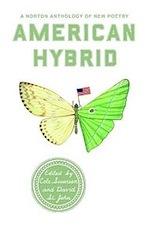Peter Riley Reviews American Hybrid
Fascinating review of Cole Swensen and David St. John’s American Hybrid anthology by Peter Riley in the British Fortnightly Review; first paras below:
IT CAN BE very difficult dealing as a reviewer with a body of poetry with which you feel you have been involved. This anthology collects poets mostly active from the 1990s to the present, with a few senior figures added, in what most people would recognise as a modernist or radical tendency. The title claims they are middle-of-the-road but this is not generally so. Throughout the earlier part of this period I was involved in an annual gathering of poets in Cambridge, a rather chaotic affair, and in ten years we invited some 15 of these poets and another ten or so who might have qualified for this anthology. They were invited in a context of innovative poetry, and as such I listened to them, admired them, exchanged books, drank with them, showed them Wittgenstein’s grave (most of them wanted to see Wittgenstein’s grave), paid them inadequately, and waved them goodbye.
Some I am still in touch with. There was a sense of a rather shaky solidarity of the innovative, the only major flaw in which was an evident lack of interest on the part of these and other foreigners in the innovative British poetry with which we surrounded them. None of us ever got a reciprocal invitation. Ten to twenty years later it all feels rather different. If I now think there are problems with a lot of this poetry, am I betraying a trust or exhibiting my own faltering instability? Probably the latter. My strategy is to largely avoid talking of particular poets, but to speak instead of the ethos of the collection as confirmed by a majority of the poets presented, not that this will get me out of trouble.
But it goes further back than that, to 1960, when the anthology The New American Poetry 1945-1960 edited by Donald Allen1 appeared. This had a tremendous impact on British poets such as myself. It seemed to open a new gateway to a greater, and refreshed, sense of what poetry could be. The variety in it was wide – the global cultural excavation of Charles Olson, the poetical “magic” of Robert Duncan and Jack Spicer, the wild oppositional populism of Ginsberg, the urbane meditations of Frank O’Hara… For some of us twentieth century British poetry was herewith abandoned (though we came back to it).
This opening extended beyond the book itself, back to William Carlos Williams and George Oppen, and we connected with other forms of Americana – abstract expressionism and free jazz. The word “open” was used a lot (“open field” was Olson’s term for his practice) for a poetry which avoided literary tropes and patterning and was free to dispose itself on the page by a new rhetoric which engaged the reader directly, a prosody that was like acts of physical movement in free play. The word “objective” was proposed as counter to the presiding subjectivity of English poetry at that time, by which most poets seemed to be knowingly offering their personal qualities to the reader through a conventionalised medium rather more than anything else, anything independently observed or thought.2 American Hybrid sees itself in its central content as in direct descent from the poetry in Allen’s anthology, which is likewise how I saw those American poets I got to know in the 1990s. Why, then do I feel uncomfortable? Because in contrast it feels like a closure. I can but rarely see any further possibilities in what these poets do, any opening to the future. Allen’s anthology is mentioned in the Introduction but quite unfairly as a collection of poems for quick one-off reading, as against the studied linguistic manipulations of hybrid poets; this is quite untrue.
[continued here.]


 Poasis II: Selected Poems 2000-2024
Poasis II: Selected Poems 2000-2024 “Todesguge/Deathfugue”
“Todesguge/Deathfugue” “Interglacial Narrows (Poems 1915-2021)”
“Interglacial Narrows (Poems 1915-2021)” “Always the Many, Never the One: Conversations In-between, with Florent Toniello”
“Always the Many, Never the One: Conversations In-between, with Florent Toniello” “Conversations in the Pyrenees”
“Conversations in the Pyrenees” “A Voice Full of Cities: The Collected Essays of Robert Kelly.” Edited by Pierre Joris & Peter Cockelbergh
“A Voice Full of Cities: The Collected Essays of Robert Kelly.” Edited by Pierre Joris & Peter Cockelbergh “An American Suite” (Poems) —Inpatient Press
“An American Suite” (Poems) —Inpatient Press “Arabia (not so) Deserta” : Essays on Maghrebi & Mashreqi Writing & Culture
“Arabia (not so) Deserta” : Essays on Maghrebi & Mashreqi Writing & Culture “Barzakh” (Poems 2000-2012)
“Barzakh” (Poems 2000-2012) “Fox-trails, -tales & -trots”
“Fox-trails, -tales & -trots” “The Agony of I.B.” — A play. Editions PHI & TNL 2016
“The Agony of I.B.” — A play. Editions PHI & TNL 2016 “The Book of U / Le livre des cormorans”
“The Book of U / Le livre des cormorans” “Memory Rose Into Threshold Speech: The Collected Earlier Poetry of Paul Celan”
“Memory Rose Into Threshold Speech: The Collected Earlier Poetry of Paul Celan” “Paul Celan, Microliths They Are, Little Stones”
“Paul Celan, Microliths They Are, Little Stones” “Paul Celan: Breathturn into Timestead-The Collected Later Poetry.” Translated & with commentary by Pierre Joris. Farrar, Straus & Giroux
“Paul Celan: Breathturn into Timestead-The Collected Later Poetry.” Translated & with commentary by Pierre Joris. Farrar, Straus & Giroux
A thoroughly enjoyable read, well researched, knowledgeable and opinionated. The ‘Lady Poverty’ quote was a nice touch.